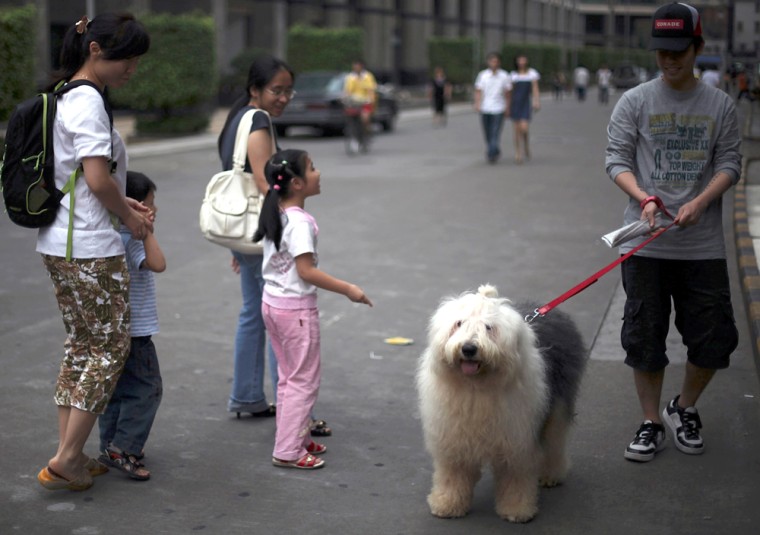Mrs. Chen can't imagine abandoning one of her two best friends: her scruffy terrier mutt and a white fluffy Pekingese mix with buggy eyes.
But that's what the government in this southern Chinese city wants the middle-aged housewife to do when a one-dog policy takes effect in Guangzhou.
Beginning July 1, each household can raise only one pooch. The regulation won't be grandfathered in, so families with two or more dogs will apparently have to decide which one gets to stay.
"It's a cruel regulation. These dogs are like family. How can you keep one and get rid of the others?" said Chen, who declined to give her full name because she feared the police would track her down and seize the dogs.
Potential for backlash
Such dog controls have touched off resentment among urban — mostly new middle class — Chinese in other cities. The Guangzhou measure comes as many are worrying about the economy, and there's potential for the regulation to trigger a public backlash.
Police and city government officials appear to be aware of the issue's sensitivity. The Associated Press spent three weeks making calls and sending faxes to officials requesting an interview about the policy. But after the requests were passed back and forth between the police and city government, neither agreed to discuss it.
The regulation appears to be part of an effort to control stray dogs in Guangzhou, once known as Canton. An hour north of Hong Kong by train, it is one of the richest cities in China and has a rapidly growing middle class that can afford to own dogs.
Many of the first-time pet owners don't bother to spay or neuter their animals and are new to the burdens of keeping an animal. The canines often end up on the street when their owners grow tired of raising a cute puppy that grew up into a big mutt and constantly demands care.
Guangzhou is also preparing to host the Asian Games next year, and crews have been scrubbing down and sprucing up the city of 12 million people. Reducing the dog population will likely mean cleaner sidewalks.
'About 10 calls a day'
People were quick to react to the regulation when it was announced in March, said Mao Mao, who six years ago founded a shelter for stray dogs called Family of the Pet. She said that before March, she would receive only a few calls a month from dog owners who wanted to give up pets.
"Since March, every day we get about 10 calls a day," said the woman, who takes in only strays and advises pet owners how to find new homes for their animals.
"I'm afraid there are going to be many more stray dogs in July when the one-dog regulation becomes effective," she said.
Other cities have one-dog policies
Many other Chinese cities, including Beijing, have long had one-dog policies. Officials commonly launch mass roundups of dogs when the canine population is deemed too big or infected with rabies and other diseases. In 2006, Beijing authorities caught 29,000 unregistered dogs in one month — a campaign that sparked public anger and protest.
Worries about rabies prompted authorities in Hanzhong city in the northern province of Shaanxi to order all the dogs in rabies-infected areas killed this month, and more than 34,000 were put to death, according to the official Xinhua News Agency.
Such killing campaigns, and rabies outbreaks, are common in China, with more than 2,000 people dying every year after being bitten by rabid dogs.
During the 2006 Beijing roundup, there were no reports of authorities entering homes to seize dogs. But witnesses accused the police of going through neighborhoods and collecting unregistered dogs from the streets, then beating them to death. In one county in the southwestern province of Yunnan, where three people had died of rabies, authorities killed 50,000 dogs, often clubbing them to death in front of their owners.
Changing its approach
Recently, Beijing has been changing its approach to animal control, said Grace Ge Gabriel, Asia regional director for the International Fund for Animal Welfare. City officials have been working with the fund and veterinarian associations to organize campaigns to spay and neuter animals, she said.
Getting the dogs fixed is key to controlling the population, she said. Also important is regulating dog breeders and keeping fees for dog tags and vaccines affordable so people will register their animals.
"Beijing realizes there are positive and non-confrontational ways to solve the problem of overpopulation, instead of draconian policies of taking pets away," she said.
Dog owners in Guangzhou aren't sure if the one-dog policy will be strictly enforced. Often Chinese authorities announce a tough new law, launch a crackdown, then ignore the measure.
Mrs. Chen, the owner of the Pekingese and terrier mixes, said her plan was to register one of her dogs with her parents. She said the Chinese are masters at finding loopholes and other ways to skirt around laws.
"In China, we have a saying," she said. "When the people at the top make a policy, the people at the bottom find a way to get around it."
